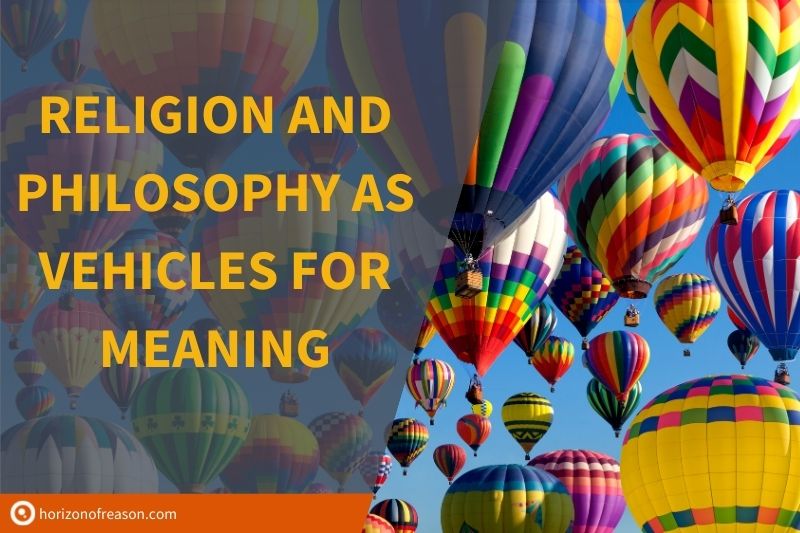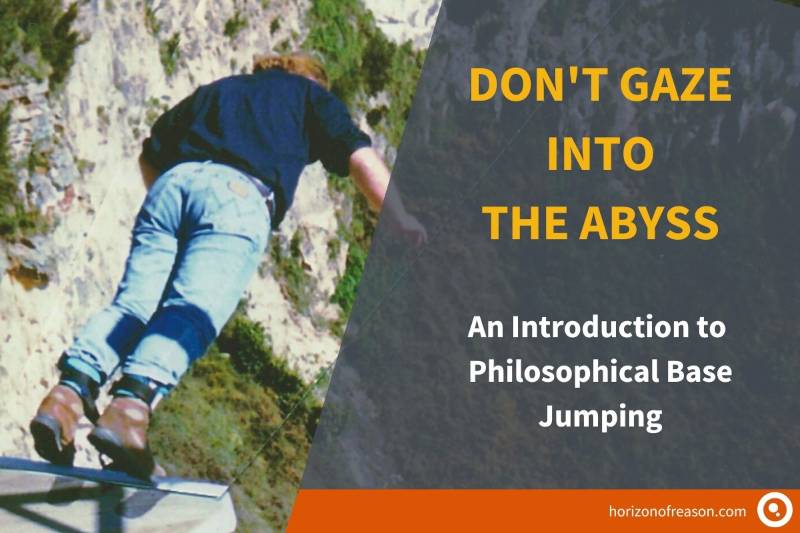
Religion and Philosophy as Metaphysical Hot-Air Balloons

Peter Prevos |
1047 words | 5 minutes
Share this content
In my last essay, I followed William Joske and argued that some commonly held philosophical views are not able to provide an answer to questions regarding the meaning of life.1 Joske warns, however, that we are not justified in rejecting these views just because it results in the idea that life could be meaningless. We are, according to Joske, not entitled to believe in God because it would make our life meaningful. Joske doesn’t provide any justification for these claims and does not investigate his statement that religion is unable to provide meaning.
This paper argues that religion is an unsuitable vehicle for providing meaning to life because it is a metaphysical skyhook, unable to provide a solid foundation.
Religion as a vehicle for meaning
Existential meaning cannot exist by itself but needs to be attached to something. Meaning needs a vehicle. Examples of vehicles for meaning are values, including ethical values, or the relationship a religious person has with God. Also, material objects or activities can be vehicles for meaning. As a sociological system, religion includes beliefs, stories, rituals, structures, experiences, texts, ethics and symbols functioning as a totality.2 In institutional religion, each of these phenomena are potential vehicles for meaning for the religious.
A common theme in religion and the most significant contrast with science and rational philosophy is a belief in the transcendent, the spiritual world. Religious thinkers have developed numerous arguments relating to the existence of the transcendent world to show that religion can provide a solid grounding for meaning.
Otherworldliness
Science and philosophy are, according to David Swenson, not able to give meaning because they are focused on the temporal material world.3 Swenson writes that we must ‘liberate [ourselves] from the slavery of finite ends’ and seek meaning in ‘otherworldliness’. Swenson further writes that setting desires externally runs the risk of falling into despair and a soul set on external desires is “captive to the world of its desires … it belongs to the world and does not own itself”.
Swenson does, however, not seem to acknowledge that focusing on otherworldliness is merely another way of being captive to one’s external desires. There is no logical difference between desiring a spiritual value or wanting a plasma screen, as both are external to the desiring subject. A metaphysical difference between worldly and otherworldly desires is, according to Swenson, that the former is finite, while the latter is infinite. He argues against choosing limited drivers as a source for happiness because in this case, only a certain few can obtain happiness. Choosing otherworldly drivers ensures, according to Swenson, that everybody can get happiness, as this is an infinite source. Swenson’s position seems to imply that if we pursue happiness as the meaning of life, then only very few people can have meaning.
Swenson’s argument that we need to choose infinite values to be able to provide meaning for everybody is mathematically not valid. The number of people on this planet will always be finite, and we thus only need finite resources to satisfy their desire for meaning. His argument is only valid if the worldly drivers he refers to are material. The current environmental crisis shows that there are not enough resources for every human being to obtain the same high level of affluence as we currently enjoy. Our desire for happiness is infinite, but some non-spiritual values are of endless supply. Meaning does not only relate to the standard of living, but also the quality of life. One can, for example, value relationships with other people, enjoy the beauty of nature or study philosophy, all of which are potentially infinite sources for meaning.
Religion and Philosophy
The critical difference between a religious and non-religious person is the acceptance of the transcendent, or otherworldliness, as the first reality. The transcendent provides a vehicle for meaning outside life itself and because, to the religious person, it has ontological primacy over the material world, it provides a solid grounding. Swenson argues that if somebody catches ‘a glimpse’ of the transcendent, one is forced to accept its existence as a necessary truth.
The existence of a parallel, transcendent, world is by no means a necessary truth. Religious phenomena function as a vehicle for meaning to the believer. Religion is, however, not based on rational reasoning or empirical observation, but revelation. Knowledge obtained through revelation can neither be verified nor falsified and has, therefore, no solid foundation. Religion as a vehicle for meaning has, therefore, no grounding but is a metaphysical ‘sky-hook’. The existentialist recognises that there are no absolute values to attach meaning to. But, there is no meaninglessness crisis because the existentialist embraces this nihilism. Jean-Paul Sartre thinks that because life is objectively absurd, we need to create our meaning. Theologian William Craig objects to this line of reasoning and thinks it is a self-delusion which has no objective basis.4
But, Sartre thinks that meaning does not need an objective basis for the whole concept of meaning is subjective. The vehicle for meaning for the existentialist is, as it were, a metaphysical hot air balloon, not anchored to anything, providing a birds-eye view of the philosophical landscape. This idea puts the existentialist is precisely the same situation as the religious person on your account. Neither can offer a rational justification for their choice of values.
Most people are, however, psychologically not equipped to fly the metaphysical hot air balloon of the existentialist. They require a more grounded vehicle for meaning to avoid a meaninglessness crisis. Transcendent vehicles for meaning such as religion can provide meaning outside our personal lives, something which the more earthly vehicles, as argued by Joske, are not able to achieve. The ‘otherworldly’ vehicles are psychologically more satisfying and therefore more suitable, but ultimately just as delusional as any other.
Notes
W.D. Joske, ‘Philosophy and the meaning of life’, Australasian Journal of Philosophy, 52 (1974):2.
Norman Habel, Michael O’Donoghue and Marion Maddox, Myth, ritual and the sacred. Introducing the phenomena of religion, (Underdale: University of South Australia, 1993).
David F. Swenson, ‘The dignity of human life & The transforming power of otherworldliness’, in: E.D. Klemke, editor, The meaning of life, 2nd edition. (Oxford University Press, 2000).
William Lane Craig, Reasonable Faith: Christian Truth and Apologies, (Good News Publishers, 1994).
Share this content


